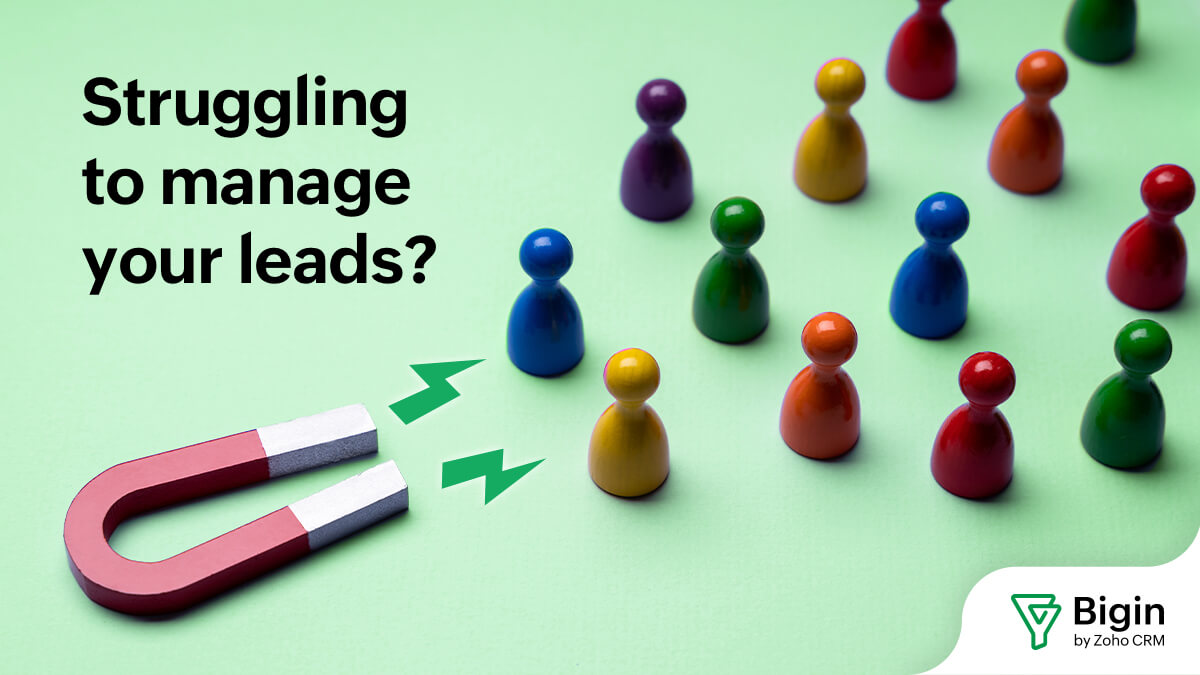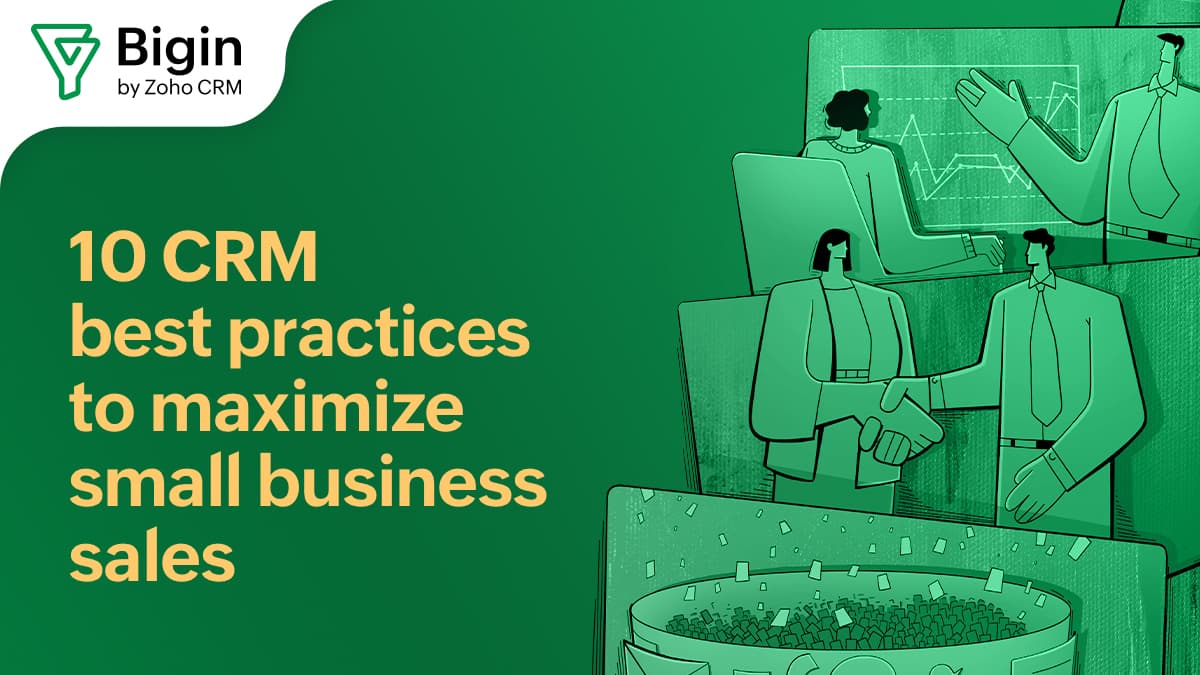- HOME
- Entrepreneurship
- Dread(the)sheets: 9 reasons why CRM is a better solution for SMBs than Excel
Dread(the)sheets: 9 reasons why CRM is a better solution for SMBs than Excel
- Published : June 13, 2022
- Last Updated : August 8, 2023
- 398 Views
- 7 Min Read

Here's an activity: Let's make a spreadsheet of the most overvalued products among businesses. Any guesses on what would take the top spot? Spreadsheets! But don't get us wrong—spreadsheets are great for what they're intended to do. We've all used them at some point. Most of us were even taught how to use them back in school because it's a useful life skill.
Spreadsheets are easy to learn and use, which is why small businesses, during their early years, rely on spreadsheets to store contact information, manage sales activities, create charts, and so on. For companies in their infancy, a spreadsheet might suffice, but here's the thing: spreadsheets were never built for companies to run their entire business on. Sure, it may get the job done but it's not the most efficient way to do it.
It's like using a kitchen knife to peel a carrot when you have a peeler, which offers an easier and safer way to do the very same thing. While using spreadsheets is certainly one way to run your business, there's a better way. It's called customer relationship management (CRM).
What is a CRM?
CRM software is many things: it's a system that unites your sales, marketing, and customer support activities and streamlines your processes, policies, and people, all in one platform. You can learn more about what a CRM is here.
How's a CRM better than spreadsheets?
Here's one way of carrying out a comparison between CRM and spreadsheets. Try asking a friend to suggest some good CRM options for your business. They'll tell you about how each CRM software offers something different and that the right choice depends on what your requirements are. Again, ask them for good spreadsheet options and you can hear them instantly say "Excel".
This might be a testament to how Excel stands out as the industry leader, but there's more to it. Every spreadsheet in the market is identical with just a handful of differences which mean nothing to the average user. There's only so much that can be done with spreadsheets with the limited features they offer. Your requirements aren't really taken into consideration, because a spreadsheet is as basic as it gets.
We understand that compared to spreadsheets, CRMs are relatively unfamiliar for many businesses—especially SMBs—so below we're providing you with nine reasons why a CRM will serve you better than spreadsheets in managing your business.
1. It's time to automate your operations
A big feature that puts CRMs leagues above spreadsheets is their ability to automate your work. Spreadsheets require that you invest a great deal of time and effort in manual labor, which is extremely inefficient. It steals away a lot of your time that you could be spending with your leads and customers.
This is what CRMs specialize in. They're all about automating routine activities and streamlining fields and records in a module with minimal human interaction. Much of what you do with a keyboard in spreadsheets can be done with a few mouse clicks in CRM. There's a workflow, a macro for everything. CRMs give you the gift of time! As a small business owner, what wouldn't you do just to have some extra time?
2. Organize and manage data efficiently
You can try your best to organize data and keep it clean in spreadsheets, but it becomes nearly impossible as your customer base grows. Eventually, your spreadsheet starts to look like a chaotic mess with data scattered across multiple sheets and no real connection or flow. These silos make it hard for you to put the data to any meaningful use.
Enter CRMs, a holistic approach to organizing data and creating contextual links between fields across modules. Here, data is always accurate, up to date, and interconnected, which helps crack down on silos and get a clear picture of leads, deals, and tasks on the table.
3. Collaborate smarter with your team
Managers sometimes find it difficult to assign leads, create tasks, and share data with their team. In such cases, CRMs can be a real lifesaver, because spreadsheets don't have any features that facilitate team coordination. Sometimes, they don't even reflect the changes in the records carried out by multiple parties at different points of time.
With CRMs, on the other hand, teams can function with a high degree of collaboration. Multiple users can work simultaneously and every action is recorded seamlessly. Additionally, CRMs follow a role hierarchy which enables admins to grant different levels of access to different parts of the CRM to different users. Managers can assign leads to team members, employees can submit specific requests and share documents, and there are also chat spaces for team members to communicate.
Lifesaver, indeed—don't you think?
4. Engage across multiple channels
In the course of your business, there are routine activities like sending welcome emails, setting up calls for negotiations, organizing meetings with different clients, and so on. In such cases, can you think of any ways spreadsheets can offer you any assistance? CRMs, on the other hand, have something to offer you for every activity mentioned above.
It's because CRMs are more than just databases—they're hubs for engagement. You can send emails, set up calls, monitor website activity, and post on social media, all from within the CRM. You can map each touchpoint, log each call, add notes, and update fields on the go for each record, which makes your CRM your ideal business partner.
5. Create tasks, events, and reminders
Task management in businesses is always a challenge, but managing tasks through spreadsheets is exhausting. This is because there are no built-in features in spreadsheets for users to create and assign tasks, add users, and handle their progress on a modular level.
CRMs are a suite for productivity; events and tasks are treated as a process and not as just some text in a field. You can assign tasks to team members, schedule calls, create events to attend, and set reminders to get things done—none of which can be done in a spreadsheet. CRMs provide actionable timelines and put systems in place to enable the effective management and completion of activities.
6. Analyze and track your performance
Just for a minute, let's assume you can manage your business operations with spreadsheets. How do you check your performance and track your business growth? Can spreadsheets do this for you? You may create charts and reports with the available data, but they're no match to the advanced analytics offered by CRM tools.
We live in times where your business activities need to be monitored in real time and quick decisions need to be made. With CRMs, you can keep track of sales trends and get live updates about any progress made. There's a whole gallery of reports that you can choose from! CRMs therefore keep you updated and enable you to make informed decisions that will drive your business's growth.
7. Access your data from anywhere, from any device
Sales people are almost always on the move with client meetings, demos, and other events. For someone who's not bound to their office desk around the clock, spreadsheets are far from convenient, and in fact, the mobile app versions of spreadsheets are borderline impossible to use. Most often, we get annoyed just trying to fetch the details from them on our mobile devices.
CRMs are specifically built with this pain point in mind. CRM mobile apps are designed to help you access information on the go with simple yet powerful UIs. Everything you can do on a desktop can also be done on the phone, thereby providing a consistent experience across all devices. Now that you know this, can you even imagine having to open your desktop every time you want to access your customers' data?
8. Customize to suit your business
CRMs not only offer you all these features but often enable you to customize them to best suit your business. You can personalize almost every feature starting with fields, stages in pipelines, workflows, templates, and more to match the specific requirements of your business. With spreadsheets, feature customization isn't really an option, and even if you try, it'll mean several hours of manual effort for "not-so-worthy" results.
9. Secure data over the cloud
With CRMs, all your data is secure from loss, misuse or breach. Cloud CRMs ensure that your data is encrypted, password protected, and fully backed up. No more carrying your data in flash drives, no more fear of getting hacked, no more worry about viruses infecting your system. Basically, CRMs eliminate all threats to the security of your data. Since customer data is extremely sensitive to your business, CRMs are clearly the safer way forward for your business.
It's time to make the shift!
We hope that the reasons listed above paint for you a picture of how adopting a CRM can help your business leap forward. Most CRM brands offer a free trial which can give you a clear idea of what they have to offer your business. Check out the options in the market and pick a brand that suits your business best.


